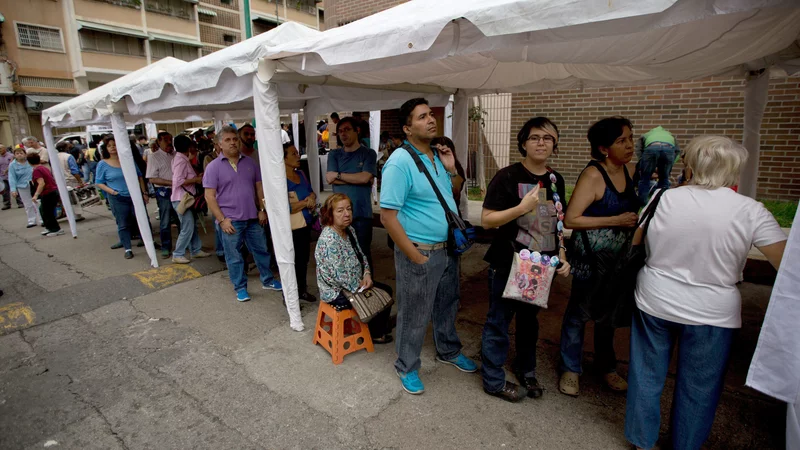
Anti-Chavista Venezuelans line up outside the Venezuelan National Electoral Council (CNE) in Caracas, the capital, in 2016. They were confirming their signatures supporting a recall referendum against President Nicolas Maduro. Fernando Llano/AP.

Orinoco Tribune – News and opinion pieces about Venezuela and beyond
From Venezuela and made by Venezuelan Chavistas

Anti-Chavista Venezuelans line up outside the Venezuelan National Electoral Council (CNE) in Caracas, the capital, in 2016. They were confirming their signatures supporting a recall referendum against President Nicolas Maduro. Fernando Llano/AP.
This Monday, January 17, Venezuela’s National Electoral Council (CNE) announced through its Twitter account that it approved three requests to initiate the procedure for an eventual recall referendum of the mandate of the President of the Republic, Nicolás Maduro. The electoral authority reported that it validated the requests, and the National Electoral Board must prepare a schedule for the collection of further requests.
The highest electoral authority explained that the approved requests, received by the CNE since January 10 were promoted by Venezuelan Movement for the Recall (Mover), All United for the Recall Referendum, and the National Executive Committee of Confedejunta alongside the Committee of National and International Democracy.
The CNE also indicated that the groups declared their intention to become promoters of a request for activating a recall referendum, which is the first step in accordance with the provisions of the regulations for a recall referendum.
The eventual activation of a referendum will require that 20% of those registered in the Electoral Registry request it, as established in Article 72 of the Venezuelan Constitution.
RELATED CONTENT: A Recall Referendum in Venezuela will be a Failure if Attempted
El Consejo Nacional Electoral (CNE) aprobó este lunes tres solicitudes de inicio de procedimiento para una eventual activación de un Referendo Revocatorio (RR) del mandato del Presidente de la República, Nicolás Maduro. pic.twitter.com/KHfETAZYOY
— cneesvenezuela (@cneesvzla) January 18, 2022
A difficult path, according to rector Marquez
Enrique Márquez, principal rector and vice president of the National Electoral Council (CNE), described as “difficult” the path facing political elements backing the recall referendum.
In an interview granted this Monday to journalist Vladimir Villegas on Unión Radio network, Márquez stressed that, although it is a right enshrined in the Constitution, experience has shown that on the two occasions in which the recall process was launched—in 2004 and in 2016—it was “traumatic.”
With this background, he indicated that it will be up to the political actors “to evaluate its relevance, its opportunity, its viability, depending on whether to activate it or not.”
“It is a complicated tool for those in power,” Márquez said. “In fact, until now… there has never been a successful recall, neither for governor, nor for mayor, nor for legislator, nor for councilor, nor for deputy. There has been none, because it is a difficult tool to accept for those in power. For anyone, not only in the executive blanch.”
RELATED CONTENT: Guaidó Comments on Possible Venezuelan Recall Referendum
The vice president of the CNE pointed out that another hurdle that the promoters of the recall, such as the Venezuelan Movement for the Recall (MOVER), will have to overcome, is to guarantee the collection of requests to grant the organization authority to promote the initiative, a step prior to the collection of signatures.
“There are much more than the two million signatures that the MOVER movement would need to activate itself as a recognized movement when requesting the recall referendum,” Márquez said, “and it would take more than four million signatures to request the recall referendum.”
For this reason, Márquez noted that if one compares “the vote that both sides of politics have obtained in recent years,” one reaches the conclusion that “the numbers are quite demanding.”
In any case, even when there are difficulties—among them the absence of a law on referendums, a debt of the Legislature with Venezuelan society—he maintained that the CNE must “be in a position to facilitate the exercise of the right (to recall), as well as facilitating the right to vote.”
“I would say that it is a difficult and complicated road,” Márquez said. “We know how difficult the political mobilization of citizens is today, the difficulties that exist… But hey, it’s up to those who request activation to get their account, to get their feasibility elements, to see if this is really good or bad for the country.”
Featured image: Anti-Chavista Venezuelans line up outside the Venezuelan National Electoral Council (CNE) in Caracas, the capital, in 2016. They were confirming their signatures supporting a recall referendum against President Nicolás Maduro. Fernando Llano/AP.
(La IguanaTV) with Orinoco Tribune content
Translation: Orinoco Tribune
OT/JRE/SL